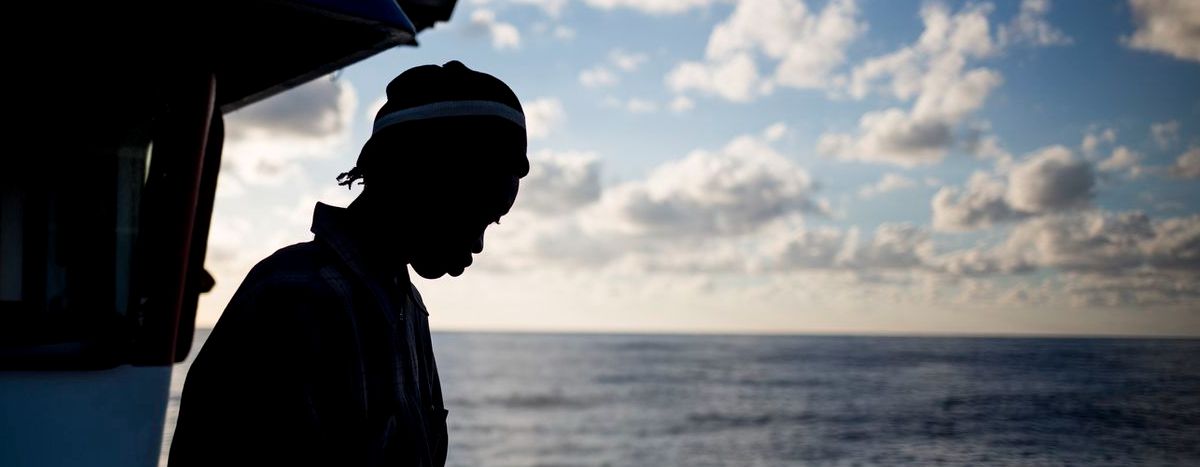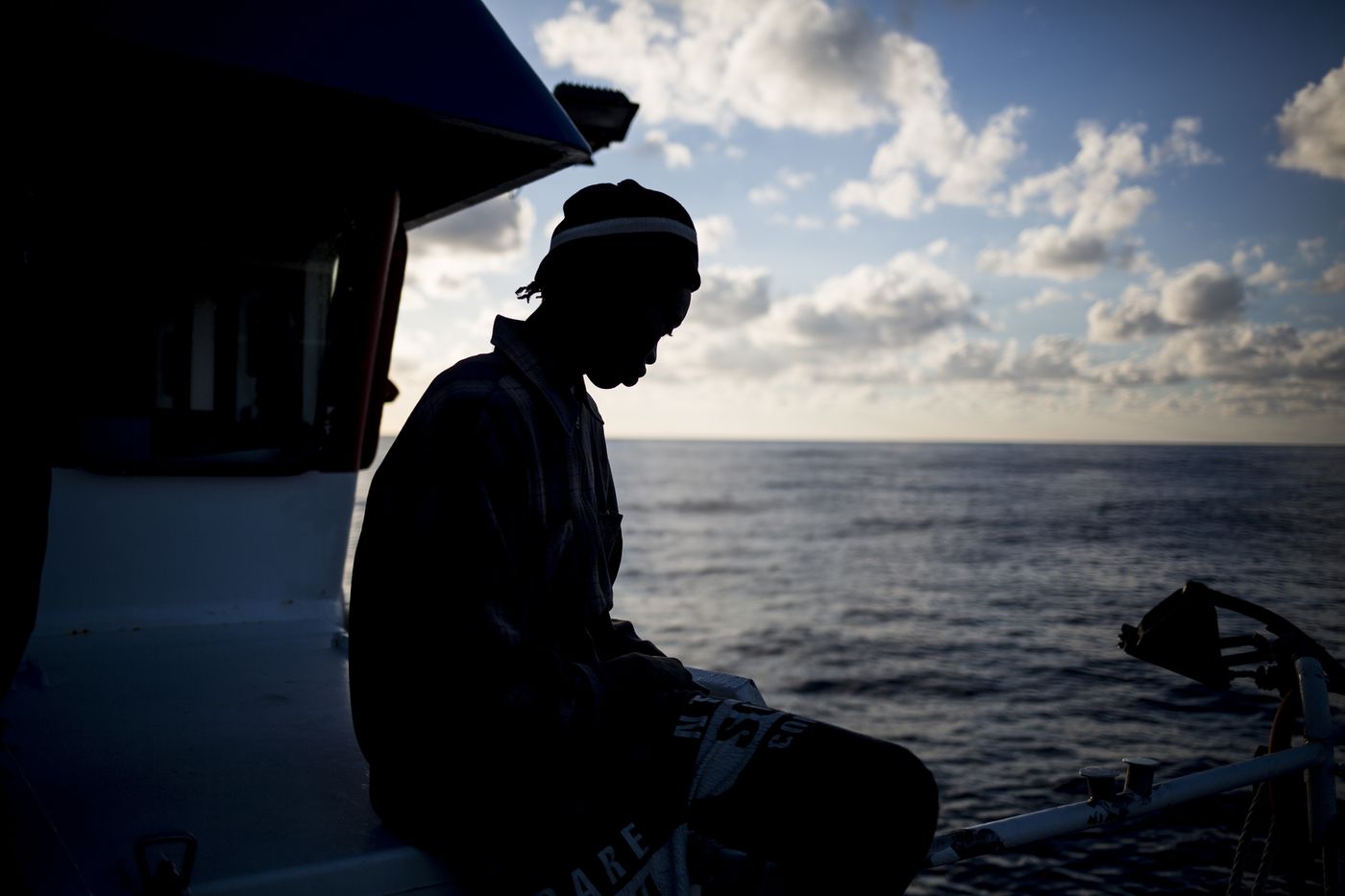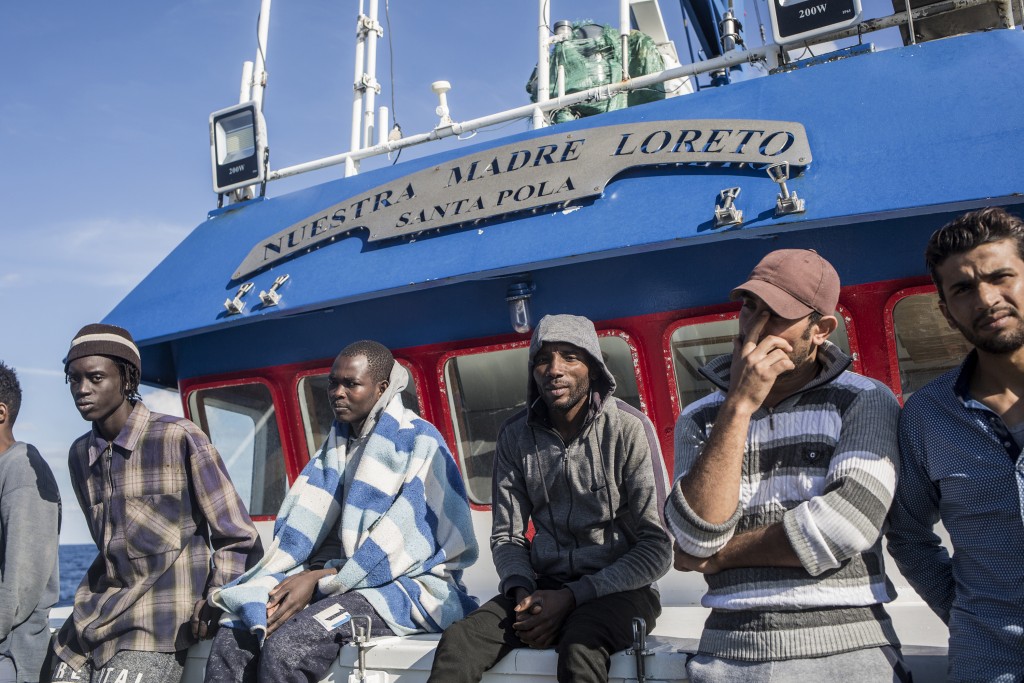
Merchant ships and illegal pushbacks: forgotten stories from the Mediterranean
Published on
Translation by:
 Rosa Giliberti
Rosa Giliberti
Since Covid-19 began spreading around the world, images of shipwrecks have largely vanished from our screens. Yet the refugee crisis is still ongoing. Day after day, crews of commercial vessels along Europe's southern frontiers, encounter people trying to reach asylum whatever the risk. Valeria Alice Colombo has witnessed the political and humanitarian consequences of these encounters first-hand.
After so many months of shipwrecks, pandemics and stories of unjustified sequestering, it is a relief to finally see the fleet of NGO ships back in the sea north of Libya. This is a stretch of land and water in which tragedies take place - virtually unheard of - every day. It's therefore even more heartening to see that there's a new ship in place. It's run by a group that Pia Klemp, ex-captain of the well-known Iuventa mission, put together. The team is also supported by an iconic, politically committed and universally loved graffiti artist.
Yet it's not just NGOs that are dealing with the humanitarian - and human - crisis in the Mediterranean. Commercial vessels have also been working in these waters, and they too are interacting with refugees who are searching for asylum.
The case of the Etienne
For 40 days the oil tanker Etienne searched in vain for a port that would authorise them to disembark 27 people that had survived a shipwreck on 4 August. Said, a relative of one the survivors, and Captain Shaaban, who was in command of a cargo ship called Talia, appealed everywhere for help. Both their calls fell on deaf ears.
At the time, Etienne's was the longest wait that any ship had had to endure for landing permissions during this phase of the crisis in the Mediterranean. "The Maltese Maritime Rescue Coordination Centre asked me to navigate towards a vessel in distress. I immediately intervened," reports Volodymyr Yeroshkin, captain of the Danish-owned oil tanker. After the rescue, however, Valletta refused to allow the shipwrecked people to disembark. Meanwhile, Copenhagen was forced to negotiate with Tunisia, so that the refugees could be taken to Tunis.
The case of the Etienne is not the first in which a European coordination centre has urged a commercial vessel to rescue a boat in international waters and then left the ship to deal with the shipwrecked people; by doing this, they are effectively delegating responsibility to African coastal countries, thereby denying the refugees any possibility of seeking asylum.
Merchant ships were the only ships that continued to work even during the first Covid-19 lockdowns. They did so in order to carry out their designated trade routes. But they were also called upon to fill an essential 'rescue gap' amidst a crisis that, while less covered in the media these days, is still ongoing.
These ships, which are not specialised in humanitarian aid, have often participated in criminal acts of forced returns at sea, which goes against both International Humanitarian Law and the Law of the Sea. Though this is not the whole story.

The first civilian rescue mission I took part in was in the waters between Libya and Italy, in autumn 2018, on board the Open Arms. While patrolling in the SAR (the Search And Rescue area) we encountered a commercial ship called Asso Ventotto.
From the deck of the humanitarian vessel, the crew told me how, a few months earlier, the rescuers had tried unsuccessfully to prevent 101 asylum-seekers from being sent back to the horrors of Libya.
Sailing close to an offshore Oil and Gas platform called Misurata, they had clearly seen the Asso Ventotto, which, instead of conveying the rescue to the coordination and rescue centres, was instructed by the platform manager to set course for Tripoli.
Two years later, the captain of the Italian merchant vessel and a representative of the ship owner were charged with illegal refoulement.
It's important to note that in most cases the refoulement the merchant vessels perpetrate does not begin from a malicious intent on the part of the crews, but is instead the result of an unscrupulous and coordinated institutional strategy.
Privatised refoulements are a crucial part of a European policy which aims to delegate 'pushbacks' to commercial ships, in which the latter are specifically ordered to take people back to the places from which they are fleeing. In summer 2018, in illustration of this, the International Maritime Organisation (IMO) elected to recognise Libya - a country still in the midst of civil war - as a constituting an independently-administered SAR.
Merchant vessel stories
On 7 November 2018, 93 people were forcibly pushed back toward Libya by the Nivin, the merchant vessel that, in coordination with the Italian Coast Guard, had rescued them in open sea. The shipwrecked people were initially told they would be taken to Italy, but the rescue was delegated to the so-called 'Libyan Coast Guard', which assigned Misurata as the port of disembarkation. The asylum-seekers, rejected in Libya, locked themselves in the cargo hold of the merchant vessel, leading to a ten-day standoff that was only settled after the violent intervention of the Libyan security forces.
On 10 February 2019, 62 people left al-Khoms and spent a day among the waves of the central Mediterranean before being rescued by the BFP Galaxy. The merchant ship’s crew provided food and told the refugees that they intended to sail toward Europe. In the morning, however, they docked in the port of Tripoli. The Italian Maritime Rescue Coordination Centre (IMRCC) claimed they had been informed by a survey aircraft to give the information to the 'competent Libyan authorities.'
Once again it was the Italian IMRCC which, on 30 May 2019, entrusted the Belgian tug boat Maridive 601 with rescuing a refugee boat. Despite legal obligations, with the ratification of international conventions, the authorities in Rome refused to provide a port of disembarkation for the merchant vessel and sent an e-mail, ordering them to refer instead to the Libyan, Tunisian or Maltese institutions. The captain headed for the nearest port, Zarzis in Tunisia. It took ten days for them to authorise the landing.
It is the European institutions that left this malicious empty spot in the Mediterranean. But it is the merchant vessels that now seem to be accomplices in the refoulement processes, along with the Libyan Coast Guard; condemning women, men and children to go back to being tortured and abused in Libya.
Or perhaps not.

The story of El Hiblu 1
Last year in March, we were sailing about 40 nautical miles north of Libya aboard the Alan Kurdi, a rescue ship managed by the German organisation Sea Eye. We were the only NGO vessel in the area since every other humanitarian ship had been confined to the port, faced with unreasonable administrative obstacles associated with lockdown.
On the evening of 27 March, the nautical emergency radio channel broadcast a distress call issued by the pilot of an aircraft, Sophia. The plane was directing an oil tanker, El Hiblu 1, towards a rubber dinghy with around 100 people on board, 80 kilometres north of Tripoli.
The merchant vessel had left Istanbul a few days earlier and was en route to the capital of Tripolitania when it decided to respond to the distress call and approach the refugees' boat.
The operation lasted several hours. From the deck of the Alan Kurdi we closely followed the radio communications between the crew of the El Hiblu 1 and the military aircraft. The sailors called for help: the people on the dinghy refused to board the oil tanker as soon as they found out the ship's course. The European aircraft offered no further assistance.
Communication broke down late at night. On board the Alan Kurdi we feared we had witnessed yet another rejection. But we were proved wrong the next morning, when, on our electronic charts, we saw the oil tanker heading north towards Malta.
The dynamics that led the captain of the commercial vessel to decide to make a 180° turn and head for Malta have been widely discussed. News of the oil tanker's 'hijacking' circulated in the press for days. Some politicians focused their attention on the El Hiblu 1 case at the time, outraged by the ingratitude of Mediterranean immigrants, who became pirates against their own rescuers. At the time of writing, despite the lack of evidence of any violent behaviour, three people, two of them minors, have been charged with mutiny before the courts in Malta.
The El Hiblu 1 case is not the first episode in which a captain has refused to take survivors back to Libya, declaring a state of danger for his crew. In summer 2018, an Italian supply ship, the Vos Thalassa, refused to hand over 67 survivors they had rescued in international waters to Libyan patrol vessels. They announced, instead, that they were going to disembark the shipwrecked people in Italy. Both Italian and Libyan authorities said it was impossible to transfer the shipwrecked people to patrol vessels headed to Tripoli because of an alleged mutiny on board the merchant vessel. An investigation was opened on charges of hijacking.
A year later, all the accused were acquitted: the judge considered the shipwrecked people's actions to be legitimate because he deemed it "indisputable that all the people on the Vos Talassa had had their right to be taken to a place of safety violated."
"Captains of merchant vessels should be encouraged to help those who risk their lives at sea at any time and in any place," said the captain of the Talia, the commercial ship which was involved in a five-day stand-off last July, when neither Malta nor Italy granted port to 52 rescued refugees.
Pascual Dura and his crew, who endured 10 days in a storm on board the small Spanish fishing boat Nuestra Madre de Loreto, while refuing to hand over 12 refugees to the Libyan authorities, know these facts all too well. I first met this small, determined group of fishermen at sea just after they won their battle, which ended with their landing in Malta. Then I met them again a year later: they had built an additional cabin in the cargo hold of the small boat so that this time they would be prepared, in case they were to find themselves in a similar circumstance.
This is a stretch of the Mediterranean that does not make the headlines. It is a world with no Twitter profiles; a world which does not end up on television. It is the domain of workers who, as part of their daily lives, encounter refugees in plight in the water. These sailors experience this crisis directly, in the middle of the sea, and, without aspirations of heroism, they intervene to save lives whatever the consequences.
This piece is published in partnership with QCodeMag. The article, which was re-formulated by staff at Cafébabel, was originally edited by Valeria Alice Colombo, a partner of the journalistic organization Brush&Bow. It was first published on QCodeMag on 16 September 2020.

Translated from Mercantili, i protagonisti senza gloria del Mediterraneo


